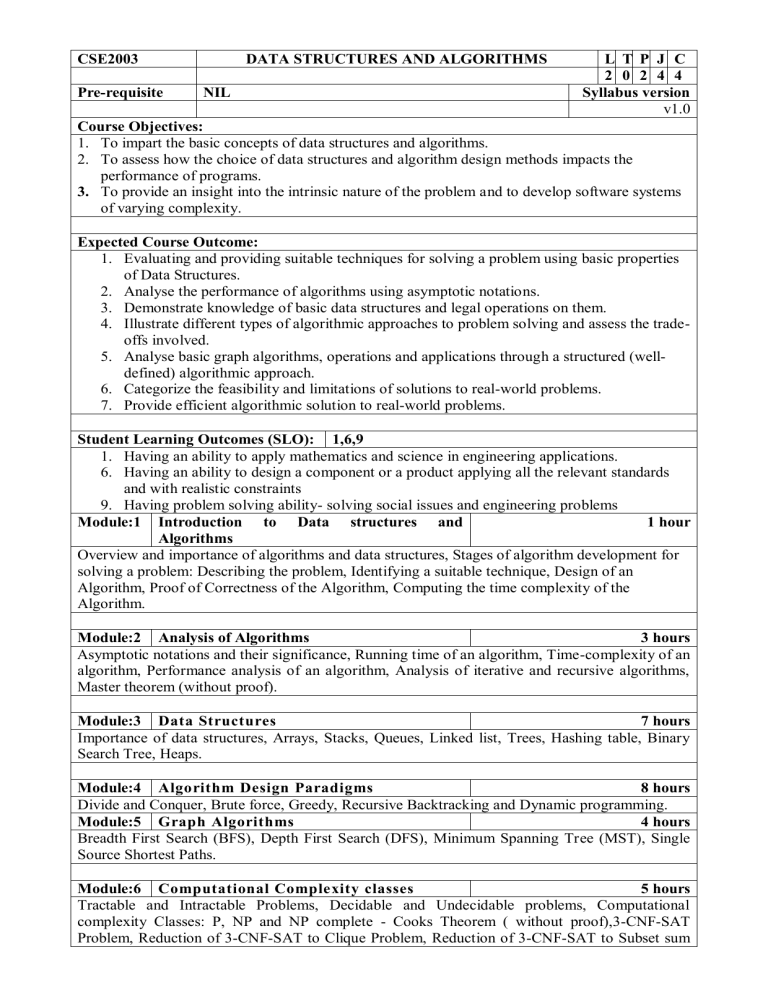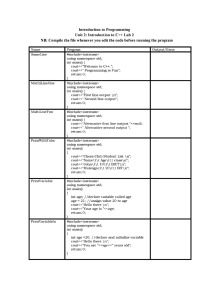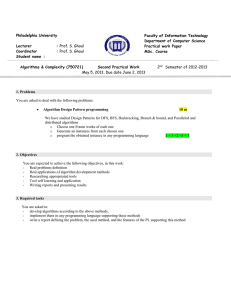
CSE2003 Pre-requisite DATA STRUCTURES AND ALGORITHMS NIL L T P J C 2 0 2 4 4 Syllabus version v1.0 Course Objectives: 1. To impart the basic concepts of data structures and algorithms. 2. To assess how the choice of data structures and algorithm design methods impacts the performance of programs. 3. To provide an insight into the intrinsic nature of the problem and to develop software systems of varying complexity. Expected Course Outcome: 1. Evaluating and providing suitable techniques for solving a problem using basic properties of Data Structures. 2. Analyse the performance of algorithms using asymptotic notations. 3. Demonstrate knowledge of basic data structures and legal operations on them. 4. Illustrate different types of algorithmic approaches to problem solving and assess the tradeoffs involved. 5. Analyse basic graph algorithms, operations and applications through a structured (welldefined) algorithmic approach. 6. Categorize the feasibility and limitations of solutions to real-world problems. 7. Provide efficient algorithmic solution to real-world problems. Student Learning Outcomes (SLO): 1,6,9 1. Having an ability to apply mathematics and science in engineering applications. 6. Having an ability to design a component or a product applying all the relevant standards and with realistic constraints 9. Having problem solving ability- solving social issues and engineering problems Module:1 Introduction to Data structures and 1 hour Algorithms Overview and importance of algorithms and data structures, Stages of algorithm development for solving a problem: Describing the problem, Identifying a suitable technique, Design of an Algorithm, Proof of Correctness of the Algorithm, Computing the time complexity of the Algorithm. Module:2 Analysis of Algorithms 3 hours Asymptotic notations and their significance, Running time of an algorithm, Time-complexity of an algorithm, Performance analysis of an algorithm, Analysis of iterative and recursive algorithms, Master theorem (without proof). Module:3 Data Structures 7 hours Importance of data structures, Arrays, Stacks, Queues, Linked list, Trees, Hashing table, Binary Search Tree, Heaps. Module:4 Algorithm Design Paradigms 8 hours Divide and Conquer, Brute force, Greedy, Recursive Backtracking and Dynamic programming. Module:5 Graph Algorithms 4 hours Breadth First Search (BFS), Depth First Search (DFS), Minimum Spanning Tree (MST), Single Source Shortest Paths. Module:6 Computational Complexity classes 5 hours Tractable and Intractable Problems, Decidable and Undecidable problems, Computational complexity Classes: P, NP and NP complete - Cooks Theorem ( without proof),3-CNF-SAT Problem, Reduction of 3-CNF-SAT to Clique Problem, Reduction of 3-CNF-SAT to Subset sum problem. Module:7 Recent Trends Algorithms related to Search Engines 2 hours Total Lecture hours: 30 hours Text Book(s) 1. Thomas H. Cormen, C.E. Leiserson, R L.Rivest and C. Stein, Introduction to Algorithms, Third edition, MIT Press, 2009. Reference Books 1. Sanjoy Dasgupta, C.Papadimitriou and U.Vazirani , Algorithms , Tata McGraw-Hill, 2008. 2. A. V. Aho, J.E. Hopcroft and J. D. Ullman, Data Strucures and Algorithms ,Pearson India, Ist Edition, 2002 3. A. V. Aho, J.E. Hopcroft and J. D. Ullman, The Design and Analysis of Computer Algorithms ,Pearson,1st edition, 2006. 4. Sara Baase , Allen Van Gelder, Computer Algorithms, Introduction to Design and Analysis, 3rd edition, Wesley Longman Publishing, 1999. Mode of Evaluation: CAT / Assignment / Quiz / FAT / Project / Seminar List of Challenging Experiments (Indicative) 1. Extract the features based on various color models and apply on image and 2 hours video retrieval 2. Arrays, loops and Lists 2 hours 3. Stacks and Queues 2 hours 4. Searching and Sorting 3 hours 5. Linked List and operations 4 hours 6. Brute force technique 2 hours 7. Greedy Technique 2 hours 8. Backtracking 2 hours 9. Dynamic Programming 2 hours 10. Trees and Tree Operations 3 hours 11. BFS and DFS 3 hours 12. Minimum Spanning Tree 3 hours Total Laboratory Hours 30 hours Mode of assessment: Project/Activity Recommended by Board of Studies 04-04-2014 Approved by Academic Council No. 37 Date 16-06-2015


